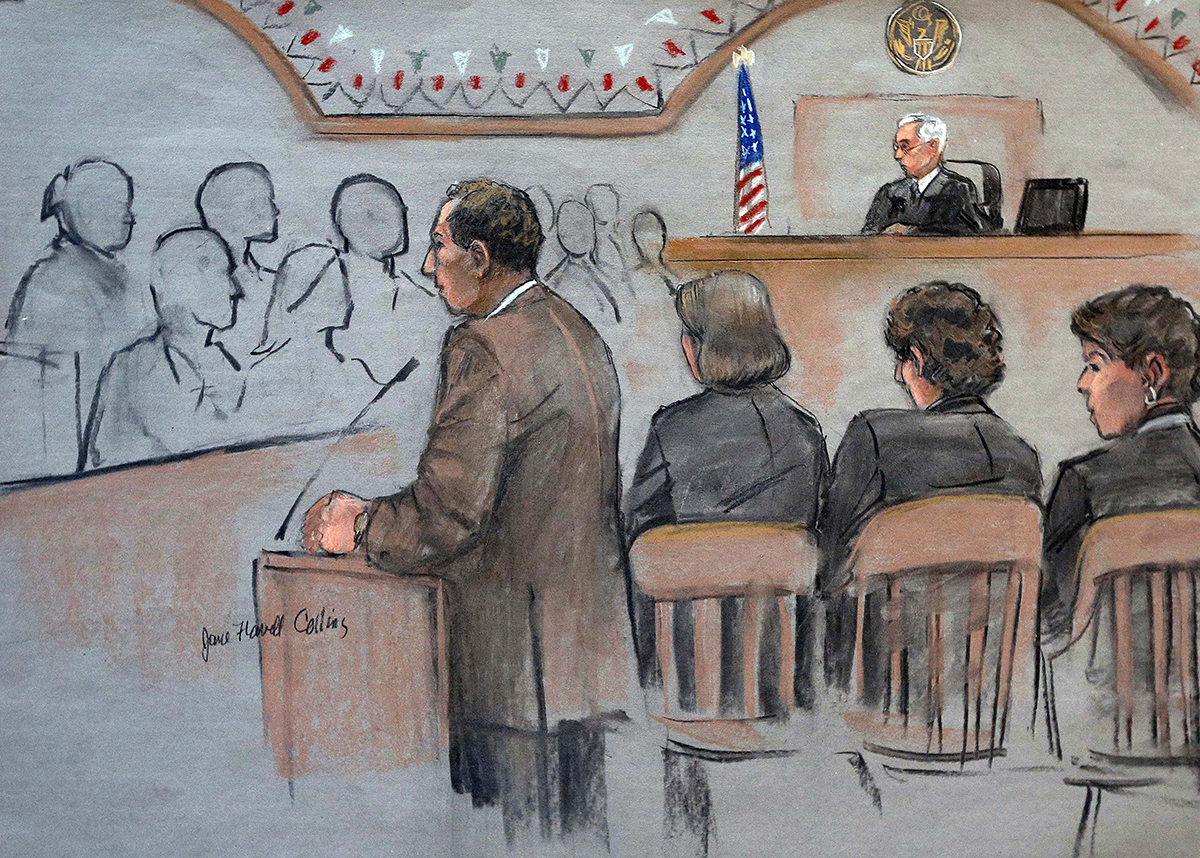Jihad and Remorse Debated as Tsarnaev Trial Goes to Jury

Photo via AP
After two and a half months, each side in the Dzhokhar Tsarnaev trial gave the jury a new argument to ponder in today’s closing statements. The defense, bolstered by Sister Helen Prejean’s testimony this week, argued that life in prison would give Tsarnaev a chance at redemption. The prosecution, arguing for death, ended with a new attack on the idea that Tsarnaev joined the Boston Marathon bombings because of his older brother’s domineering influence.
Judy Clarke, the famed defense lawyer, argued that Tsarnaev’s comment to Prejean that “no one deserves to suffer like [the bombing victims] did” proves he has changed.
“That just does not sound like the same boy who wrote in the boat, ‘I don’t like killing innocent people,’” Clarke said. “That is growth, that is maturity. What Sister Helen gave you the opportunity to see is, this kid is on that path toward growth and remorse.” An unrepentant jihadi, she added, wouldn’t meet with a Catholic nun and reveal his regrets to her.
At last, the defense had a way to counter the prosecution’s portrait of Tsarnaev as a remorseless killer who bought milk and tweeted he was “stress-free” after the bombings—and the indifferent face Tsarnaev presents at trial. Today, the judge told jurors they could not consider the defendant’s appearance or demeanor. But throughout the trial, he sat a few feet from the witness stand, in the jury’s line of sight. Surely the jurors, like the press, noticed Tsarnaev’s slouch and his stare at the floor.
Today, Clarke returned to the defense’s main argument at trial: that Tamerlan Tsarnaev planned the bombing and influenced his younger brother to join him. “Jahar would not have done this [but] for Tamerlan,” she argued.
Clarke finished with an impassioned argument that life in prison would allow more closure than an execution. For Tsarnaev, there’d be “no glory and stature that martyrdom will bring,” she argued. She hinted that some victims and their families preferred a life sentence. “His name will fade from headlines, fade from the news altogether, and those who so desperately no longer want to be reminded of him won’t.” Life in prison, she argued, “allows for hope, for redemption and a greater opportunity for healing for everyone involved,” and “demonstrates the resilience of this community.”
Prosecutor William Weinreb’s rebuttal mounted the strongest attack yet on the older-brother defense.
“Where is the evidence of mind control? Evidence he was under his brother’s spell?” Weinreb asked. “We haven’t heard it from any witnesses, just the mouths of defense attorneys.” He argued that the younger Tsarnaev was more like his brother than different. “Both were physically strong, one a boxer, one a wrestler. Both were emotionally strong, took care of themselves, and didn’t need a shoulder to cry on. Both were men of action.”
Weinreb also attacked the defense argument that Chechens traditionally obey their older brothers. “There was no tradition of obeying elders in the Tsarnaev family,” he said. Tsarnaev’s parents, one Chechen and one Avar, had rebelled against their families by marrying outside their ethnicities. Tamerlan defied his mother’s wishes by marrying Katherine Russell, who wasn’t Muslim. (Russell converted to Islam after the marriage, Clarke had reminded jurors, citing Tamerlan’s influence.)
Today, more than any other day in the trial, the prosecutors repeatedly called Tsarnaev a terrorist—they used some variation of the word “terror” more than two dozen times. Weinreb noted that Tsarnaev attacked the marathon to punish the United States for its foreign wars. Tsarnaev’s note in the drydocked boat, he said, explained why he would “shred people alive in front of friends and family members to advance a political agenda.”
To counter Clarke’s argument that Tamerlan radicalized his younger brother by plying him with jihadi magazines, videos, and lectures, Weinreb argued that Tsarnaev’s choice was his own. “Does it matter whether you get your jihadi files from your brother, distant cousin, or Anwar al-Awlaki himself?” he asked. “The defendant had to become a believer, and that is something he did entirely by himself.”
Weinreb questioned whether Prejean’s testimony about Tsarnaev’s sympathy amounted to much. He argued that Tsarnaev “expressed pretty much the same sentiment” on the boat’s wall, when he wrote that he didn’t like killing innocent people, but it was sometimes allowed. “The fact he’s willing to go so far as to say, ‘No one should have to suffer like that’—what does that really tell you about his beliefs?”
For the government, which had fought to keep Prejean off the stand, it may have been just enough to blunt her testimony and the defense’s final effort to save Tsarnaev’s life.


